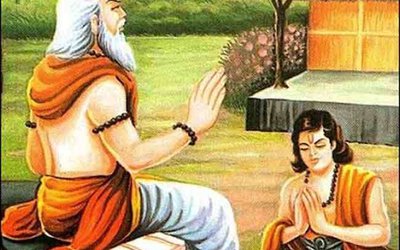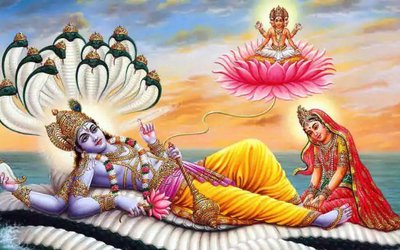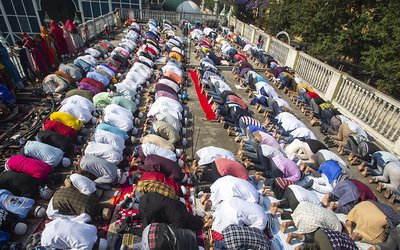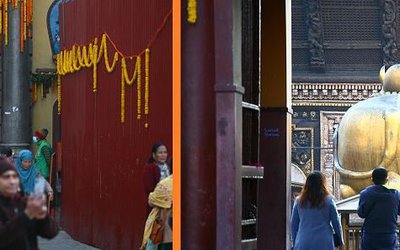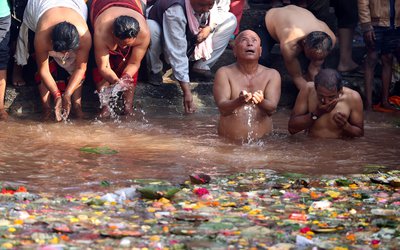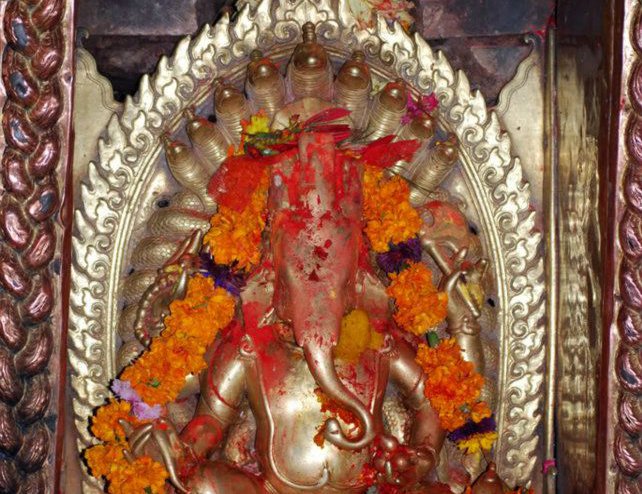
Tuesday(September 19) is Ganesh Chaturthi and the birthday of Lord Ganesh. Hindu devotees all over Nepal offered prayers at the Ganesh Temple during the Ganesh Chaturthi festival in Kathmandu. The festival marks the birthday of Lord Ganesha who is widely worshiped by Hindus as the god of wisdom, prosperity and good fortune.
The festival of Ganesh Chaturthi is celebrated with pomp and fervour across India. It is also known as Vinayaka Chaturthi and marks the birth of Lord Ganesha, the deity of wisdom, prosperity and good fortune. This vibrant and colourful festival runs for 10 days and holds a special place in the hearts of millions across the world. In India, celebrations are grand and many celebrities too place Ganesha idol at their homes to mark the occasion. The dates of the festival are decided on the basis of Hindu calendar, which say that Lord Ganesha was born during the Shukla Paksha of the Bhadrapada month.
According to the Gregorian calendar, the date falls in the months of August or September.
When will Ganesh Chaturthi be celebrated this year?
There is some confusion about the date of the celebration of Ganesh Chaturthi, like Janmashtami and Raksha Bandhan. This year, the 10-day-long festival will begin on September 19 and continue till September 28.
As per the Hindu calendar, Vinayak Chaturthi will begin on Monday (September 18) at 12.39pm and end at 8.43 pm on Tuesday (September 19). This is the auspicious time for performing the pooja for the event.
The Newar community celebrates the day as Chatha Parva while the Tharu community observes as Chauthi Chan. Newar community holds the view that worshiping The Moon This Day Helps To Free Of False Accusation
The festival is celebrated every year on the fourth day of the bright fortnight in the month of Bhadra (Bhadra Shukla Chaturthi) according to the lunar calendar.
This year, the month of September marks one of the most auspicious festivals for Hindus - Ganesh Chaturthi. Nepal’s Newar community also celebrates Ganesh
Chauthi's special offering to Lord Ganesh.
Similarly, it will be marked with much pomp and fervor in the Indian state. Maharashtra, Karnataka, Gujarat, Odisha, Goa, West Bengal, Chhattisgarh, and Uttar Pradesh. The festival will come to an end on September 21.
Cha:Tha In Kathmandu
Ganesh Chaturthi is known as (Cha: Tha Puja) among the Newar community of Kathmandu Valley. The festival is celebrated every year on the fourth day of the bright fortnight in the month of Bhadra Shukla Chaturthi according to the lunar calendar.
Ganesh is also worshipped as Ganapati, Binayak, who is regarded revered as the remover of the obstacles and the patrons of arts and science. He is also known as a god of intellect and wisdom. He is worshipped at the beginning of any religious and spiritual functions. As a protector, every Newar community installed the lord Ganesh in their locality.
Kathmandu Valley has many Ganesh Temples. On this day, devotees throng to Ashok Binayak, Chandra Binayak in Kathmandu, Surya Binayak, Kamal Binayak in Bhaktapur and Karya Binaya and Jal Binayak in Lalitpur.
Ganesh is one of the most popular deities of Nepal worshipped by Hindus and Buddhists both. Ganesh is the god of good luck and success. He is very wise but looking very child-like in appearance. A tradition has it that small boys in Nepal as Ganesh and small girls as Kumari (vestal virgin) are worshipped with great respect and love. This is very common here on important religious occasions.
It is very interesting to note that Ganesh has a very heavy body yet he has chosen a very small rat for his mount. This is to signify that everything big in the world begins with the small hand
How Newar’s Celebrate Ganesh Chauthi
Newar Commuity celebrates the day as Cha Tha (च: था). There is a very interesting local folklore about the day. According to folklore, one day all the gods had assembled at the papal tree to make fun. All the gods rode the tree speedily to reach the top. However, Ganesh, who has a big stomach and trunk, rode bit by bit in a ride of a small rat. When the moon god saw his style in his body, he laughed making his style fun. Looking at all this, Ganesh was angry with Moon who ridicule him with a false pride of beauty and smartness. Angered by Moon’s behavior, lord Ganesh immediately cursed him with the words, “who see you in the night should become a thief so that light from your source of light does not fall on you. All the gods disappeared fearing the consequences of the curse of Ganesh knowing that after seeing the moon became a thief.
All the gods including Moon prayed collectively to angry Ganesh and plead with him seeking an apology for the mistakes. Later on, Ganesh agreed to withdraw his curse. But, Ganesh said he could not withdraw the curse completely. He further said that the moon had to face the consequences of the curse one day every year. Ganesh added that this is necessary to remove false pride about the moon. This is why there is a belief that those who see the moon on this day become a thief. Thus, no one should see the moon on the day of Ganesh Chaturthi.
Unlike other parts of the world, Newar communities have their own way to celebrate Ganesh Chauthi. There is a practice of worshiping the moon on this day. It is the belief that worshiping the moon this day helps to free of false accusations. People worship the moon after sunset by offering ginger, pear beans, soya beans, cucumber, roasted corn, groundnut, wheat, chickpeas, almond and others in green leaves.
There is a popular belief that if somebody goes to the temple of Gnash early in the morning for prayer he or she gets success on anything he does that day.
Significance and History:
To celebrate Ganesh Chaturthi, also known as Vinayaka Chaturthi, devotees bring home idols of Lord Ganesh to worship the deity, eat good food, enjoy with friends and family, and in the end, immerse the idols. Additionally, temples offer prayers and distribute sweets such as modaks because it is Lord Ganesh's favorite. The festival marks the birth of Lord Ganesh, the god of wisdom and prosperity. It falls in the Bhadrapada month of the Hindu calendar, which falls in August-September.
Lord Ganesh is considered a symbol of wisdom, writing, travel, commerce and good fortune. He is also called Gajanana, Gajadanta, and Vighnaharta. These are few names among his 108 other titles.
The Hindu mythology tells the legend of Goddess Parvati creating baby Lord Ganesh using sandalwood paste and asking him to guard the entrance while she took a bath. When Lord Shiva arrived at the entrance and told Ganesh that he wanted to visit Goddess Parvati, Ganesh refused to allow him to pass through. This made Lord Shiva angry and enraged he severed the child's head. When Goddess Parvati realized what had happened, she was heartbroken.
Seeing Goddess Parvati overwhelmed with grief, Lord Shiva promised to bring baby Ganesh back to life. He instructed his followers to search for the head of the first living creature they could find. However, they could only find a baby elephant's head. That is how Lord Ganesha came back to life with the head of an elephant.
Ganesh Chaturthi is celebrated as birth anniversary of Lord Ganesh. On Ganesh Chaturthi, Lord Ganesh is worshipped as the god of wisdom, prosperity and good fortune. It is believed that Lord Ganesh was born during Shukla Paksha of Bhadrapada month. Currently Ganesh Chaturthi day falls in month of August or September in English calendar.
The Ganeshotsav, the festivity of Ganesh Chaturthi, ends after 10 days on Anant Chaturdashi which is also known as Ganesh Visarjan day. On Anant Chaturdashi, devotees immerse idol of Lord Ganesh in water body after a gala street procession.
Ganapati Sthapana and Ganapati Puja Muhurat
Ganesh Puja is preferred during Madhyahna as it is believed that Lord Ganesh was born during Madhyahna Kala. Madhyahna Kala is equivalent to midday according to Hindu division of the day.
As per Hindu time-keeping, the time duration between sunrise to sunset is divided into five equal parts. These five parts are known as Pratahkala, Sangava, Madhyahna, Aparahna and Sayankal. Ganapati Sthapana and Ganapati Puja on Ganesha Chaturthi are done during Madhyahna part of the day and as per Vedic astrology it is considered the most appropriate time for Ganesha Puja.
During midday, Ganesha devotees perform detailed ritualistic Ganesha Puja which is known as Shodashopachara Ganapati Puja.
Prohibited Moon Sighting on Ganesha Chaturthi
It is believed that one should not sight the moon on Ganesh Chaturthi. Sighting moon on Ganesh Chaturthi creates Mithya Dosham or Mithya Kalank (कलंक) which means false accusation of stealing something.
As per Puranic legends, Lord Krishna was falsely accused of stealing precious jewel named Syamantaka. After seeing plights of Lord Krishna, Sage Narada informed that Lord Krishna sighted moon on the day of Bhadrapada Shukla Chaturthi and because of that he has been cursed with Mithya Dosha.
Sage Narada further informed Lord Krishna that God Chandra has been cursed by Lord Ganesha that anyone who sighted moon on Shukla Chaturthi during Bhadrapada month would be cursed with Mithya Dosha and would be tainted and dishonoured in the society. On the advice of sage Narada Lord Krishna observed Ganesha Chaturthi fasting to get rid of Mithya Dosha.
Mithya Dosha Prevention Mantra
Depending on start and end time of Chaturthi Tithi, sighting of moon might be prohibited for two consecutive days. According to DrikPanchang.com rules, Moon should not be sighted while Chaturthi Tithi is prevailing. Further, Moon risen during Chaturthi should not be sighted even if Chaturthi Tithi gets over before moonset.
If anyone has mistakenly sighted moon on Ganesha Chaturthi then he should chant following Mantra to get rid of the curse –
सिंहः प्रसेनमवधीत्सिंहो जाम्बवता हतः।
सुकुमारक मारोदीस्तव ह्येष स्यमन्तकः॥
- EU Ambassador To Nepal Veronique Lorenzo Paid A Courtesy Call On Rana
- Jul 27, 2024
- 139 People Died In The Disaster
- Jul 27, 2024
- Monetary Policy Eases Managing Capital Fund Stress
- Jul 27, 2024
- Weather Forecast: Chances Of Heavy Rainfall Is Likely In One Or Two Places Of Sudu Paschim And Bagmati Province
- Jul 27, 2024
- The Sentiment Of Monetary Policy Seems Focused On Increasing Eemand: FNCCI President Chandra Prasad Dhakal
- Jul 26, 2024

